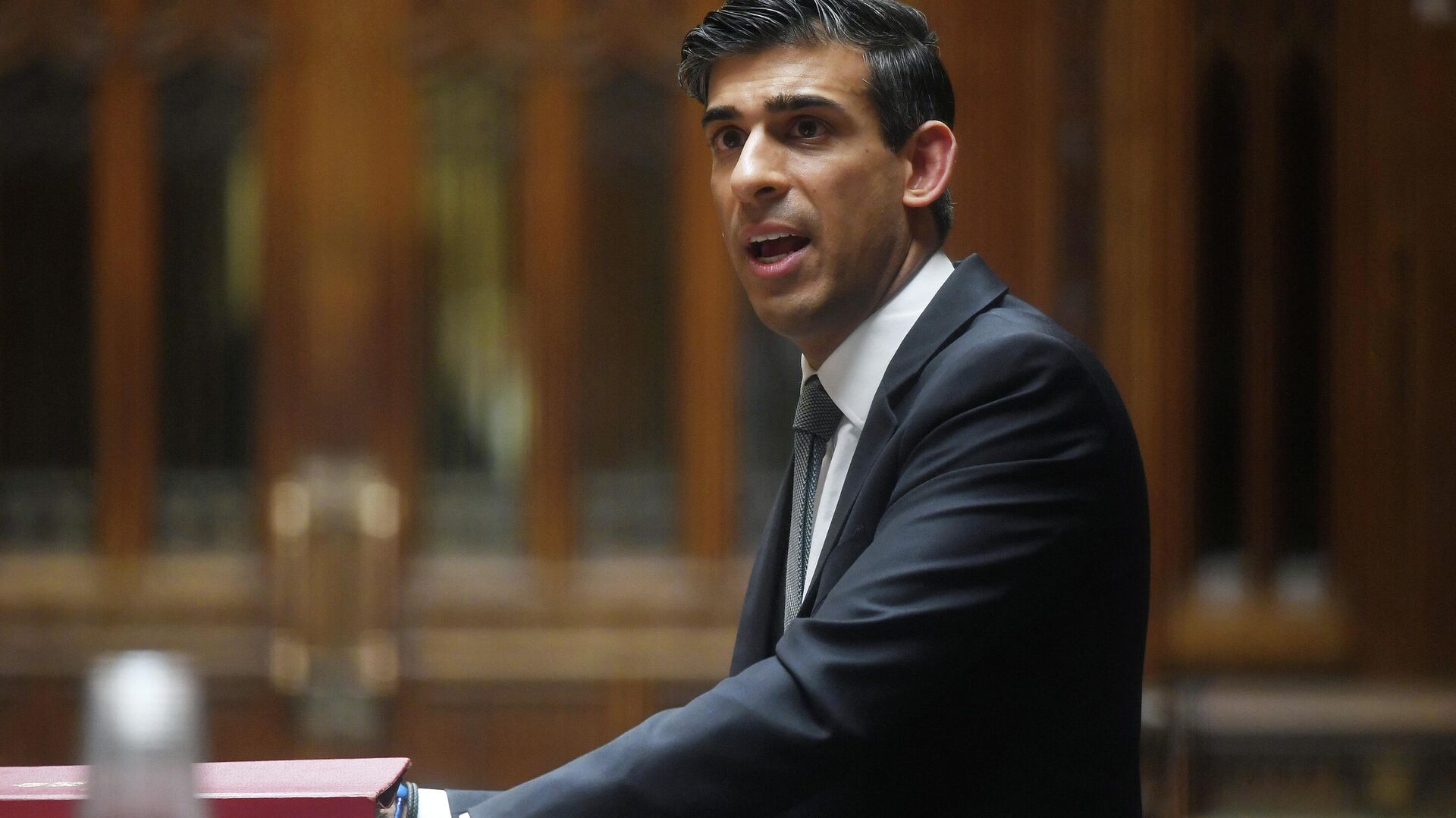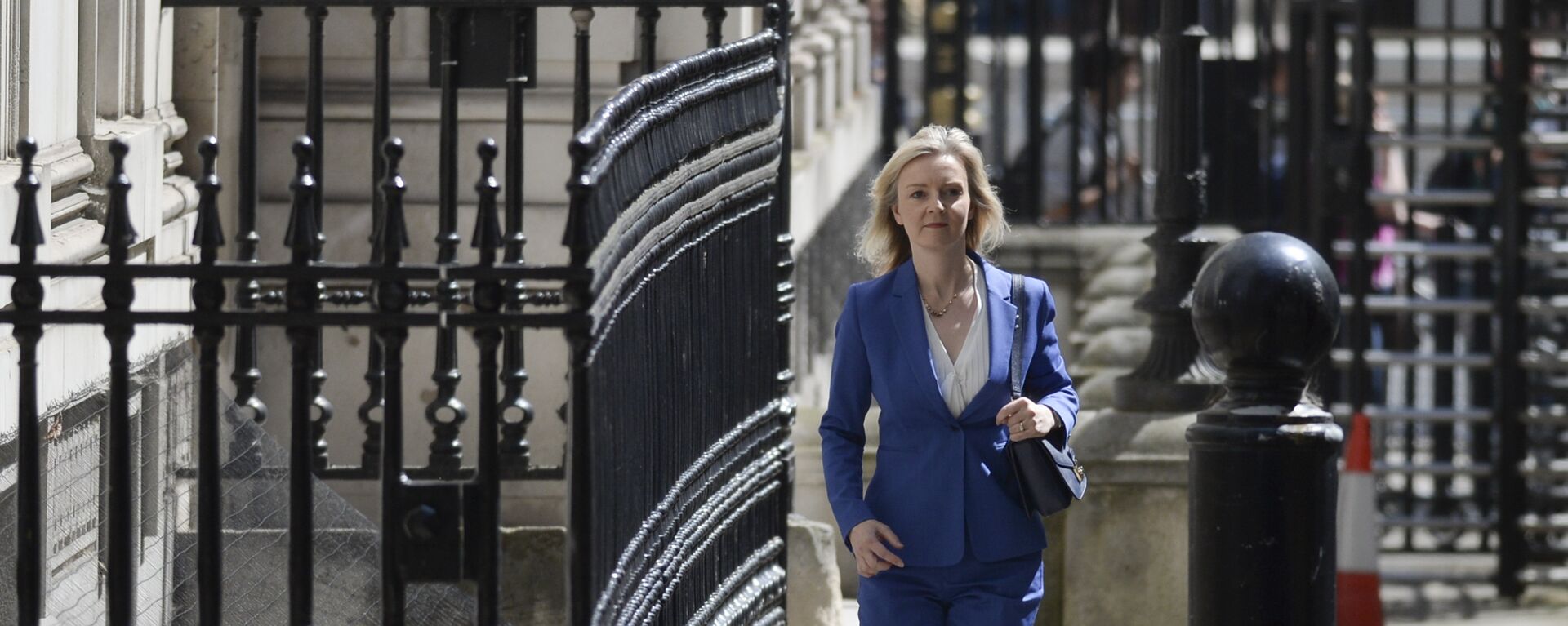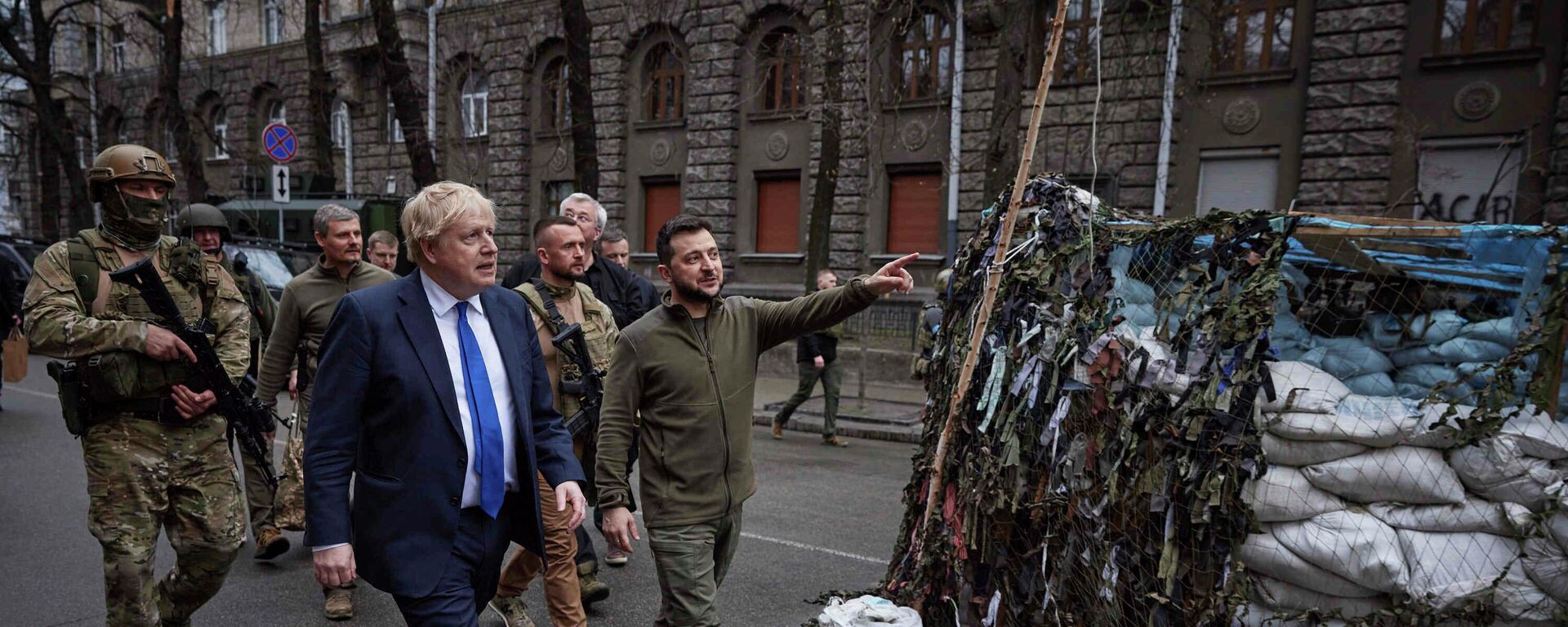https://sputnikglobe.com/20220502/sunak-reportedly-left-mod-flabbergasted-by-ignoring-warning-that-uk-could-miss-nato-spending-goal-1095193845.html
Sunak Reportedly Left MoD 'Flabbergasted' by Ignoring Warning That UK Could Miss NATO Spending Goal
Sunak Reportedly Left MoD 'Flabbergasted' by Ignoring Warning That UK Could Miss NATO Spending Goal
Sputnik International
According to latest estimates, the number of NATO nations meeting the alliance's spending target of 2 percent of their gross domestic product (GDP) has... 02.05.2022, Sputnik International
2022-05-02T05:38+0000
2022-05-02T05:38+0000
2023-05-28T15:19+0000
rishi sunak
ben wallace
nato
cost of living
inflation
ukraine
united kingdom (uk)
https://cdn1.img.sputnikglobe.com/img/07e6/04/0c/1094691386_0:86:2939:1739_1920x0_80_0_0_a2556fc89796c7c995690f5283e37635.jpg
Chancellor Rishi Sunak ignored a warning from the Ministry of Defence that spiraling inflation and the rush to send weapons to Ukraine could result in Britain failing to meet its NATO spending commitments by 2025, British daily tabloid The Sun reported.The North Atlantic Treaty Organisation (NATO) set alliance members the target of spending 2 percent of their gross domestic product (GDP) on defence.The alliance estimated that 10 of its 30 members had spent the agreed amount on defence until June 2021. However, latest figures show that only eight countries are meeting the guideline, with UK being one of them.In a letter dated 11 March, UK Defence Secretary Ben Wallace is said to have alerted Chancellor of the Exchequer, Rishi Sunak, to the fact that the UK would not be able to meet the alliance's spending target, ahead of Sunak's Spring Statement. This letter didn't even elicit a response.Before the Spring Statement - also known as the "mini-budget" - delivered on 22 March, the Treasury stated several times that no formal request for additional defence spending had been received.Thus Sunak, failing to heed the MoD's warning, did not increase defence spending in his statement.Furthermore, it is claimed that Treasury officials “put pressure” on the MoD to withdraw the letter in a move that is described as having “sparked tensions” in the Cabinet.According to the report in The Sun, Treasury insiders confirmed on Sunday night that the letter in question had been received, but insisted that no formal business proposal was included beyond a “plea” for extra funding.Last week, Ben Wallace’s call for more defence spending was backed by UK Foreign Secretary Liz Truss.Britain needs to raise spending on defence as insurance, she insisted, as she addressed diplomats at Mansion House, the official residence of the Lord Mayor of London.Truss said spending 2 percent of GDP on defence was a “floor, not a ceiling”, adding that NATO must increase support for Ukraine with “heavy weapons, tanks and planes”.Britain has already become one of the largest suppliers in Europe of arms to Ukraine, where Russia is conducting a special operation to demilitarise and de-Nazify the country in response to a request of assistance from the Donetsk and Lugansk People’s republics (DPR and LPR) after they came under unendurable attacks by Kiev authorities.The Russian Defence Ministry emphasised that Moscow had no plans to occupy the country, with the operation exclusively targeting Kiev’s military infrastructure.However, despite Moscow's warning that arming the Kiev regime was only prolonging the combat, the UK has sent more than 5,000 anti-tank missiles, 1,360 anti-structure munitions, five air-defence systems with more than 100 missiles, and 4.5 tonnes of plastic explosive, according to the Ministry of Defence. Ben Wallace said the UK had already provided Kiev with some £200 million in military aid.Swelling InflationThis vast outpouring of aid comes as the UK braces itself for a cost of living squeeze with energy prices rocketing in the past months for a whole host of reasons. Moreover, economists have warned that the fallout from western countries slapping sanctions on Russia over the Ukraine crisis would hugely affect food and energy prices to a degree that inflation could reach double digits later this year.Recent figures from the Office for National Statistics (ONS) showed inflation rose by more than expected in March to reach 7 percent, driven by the soaring price of fuel, energy and groceries at the beginning of the year.In early March, the Bank of England warned that inflation was on track to peak close to 10 percent later this year amid the surge in global wholesale energy prices, driven in part by sanctions on Russia’s energy imports.
https://sputnikglobe.com/20220427/uk-foreign-secretary-to-call-for-more-defence-spending-amid-cost-of-living-crisis-1095089905.html
https://sputnikglobe.com/20220426/russian-mod-warns-of-proportional-response-to-uk-comments-about-kiev-striking-targets-in-russia-1095073149.html
https://sputnikglobe.com/20220425/uk-households-face-cost-of-living-hell-forced-to-choose-between-meals-or-heating-shows-poll-1095028889.html
ukraine
united kingdom (uk)
Sputnik International
feedback@sputniknews.com
+74956456601
MIA „Rossiya Segodnya“
2022
News
en_EN
Sputnik International
feedback@sputniknews.com
+74956456601
MIA „Rossiya Segodnya“
Sputnik International
feedback@sputniknews.com
+74956456601
MIA „Rossiya Segodnya“
rishi sunak, ben wallace, nato, cost of living, inflation, ukraine, united kingdom (uk)
rishi sunak, ben wallace, nato, cost of living, inflation, ukraine, united kingdom (uk)
Sunak Reportedly Left MoD 'Flabbergasted' by Ignoring Warning That UK Could Miss NATO Spending Goal
05:38 GMT 02.05.2022 (Updated: 15:19 GMT 28.05.2023) According to latest estimates, the number of NATO nations meeting the alliance's spending target of 2 percent of their gross domestic product (GDP) has continued to fall, with the UK at present one of only eight nations out of 30 believed to be hitting the target. Britain is also listed as fourth in the list of proportional spending.
Chancellor Rishi Sunak ignored a warning from the Ministry of Defence that spiraling inflation and the rush to send weapons to Ukraine could result in Britain failing to meet its NATO spending commitments by 2025, British daily tabloid The Sun reported.
The North Atlantic Treaty Organisation (NATO) set alliance members the target of spending 2 percent of their gross domestic product (GDP) on defence.
The alliance
estimated that 10 of its 30 members had spent the agreed amount on defence until June 2021. However, latest figures show that only eight countries are meeting the guideline, with UK being one of them.
In a letter dated 11 March, UK Defence Secretary Ben Wallace is said to have alerted Chancellor of the Exchequer, Rishi Sunak, to the fact that the UK would not be able to meet the alliance's spending target, ahead of Sunak's Spring Statement. This letter didn't even elicit a response.
Before the
Spring Statement - also known as the "mini-budget" - delivered on 22 March, the Treasury stated several times that no formal request for additional defence spending had been received.
Thus Sunak, failing to heed the MoD's warning, did not increase defence spending in his statement.
Furthermore, it is claimed that Treasury officials “put pressure” on the MoD to withdraw the letter in a move that is described as having “sparked tensions” in the Cabinet.
“MoD officials are still flabbergasted that they were barred from engaging with the Treasury on this matter and the letter appeared to have gone in the bin at No 11,” a Whitehall source is cited as saying.
According to the report in The Sun, Treasury insiders confirmed on Sunday night that the letter in question had been received, but insisted that no formal business proposal was included beyond a “plea” for extra funding.
“This Government has provided the largest increase in defence spending since the Cold War, increasing the defence budget by £24 billion. This was an exceptional uplift in defence spending and the decision to prioritise taxpayers' money on our security was the right one,” a Treasury spokeswoman was cited as saying.
Last week, Ben Wallace’s call for more defence spending was backed by UK Foreign Secretary Liz Truss.
Britain needs to raise spending on defence as insurance, she insisted, as she addressed diplomats at Mansion House, the official residence of the Lord Mayor of London.
Truss said spending 2 percent of GDP on defence was a “floor, not a ceiling”, adding that NATO must increase support for Ukraine with “heavy weapons, tanks and planes”.
Britain has already become one of the largest suppliers in Europe of arms to Ukraine, where Russia is conducting a special operation
to demilitarise and de-Nazify the country in response to a request of assistance from the Donetsk and Lugansk People’s republics (DPR and LPR) after they came under unendurable attacks by Kiev authorities.
The Russian Defence Ministry emphasised that Moscow had no plans to occupy the country, with
the operation exclusively targeting Kiev’s military infrastructure.
However, despite Moscow's warning that arming the Kiev regime was only prolonging the combat, the UK has sent more than 5,000 anti-tank missiles, 1,360 anti-structure munitions, five air-defence systems with more than 100 missiles, and 4.5 tonnes of plastic explosive, according to the Ministry of Defence. Ben Wallace said the UK had already provided Kiev with some £200 million in military aid.
This vast outpouring of aid comes as the UK braces itself for a
cost of living squeeze with energy prices rocketing in the past months for a whole host of reasons. Moreover, economists have warned that the fallout from western countries slapping sanctions on Russia over the Ukraine crisis would hugely affect food and energy prices to a degree that inflation could reach double digits later this year.
Recent figures from the Office for National Statistics (ONS) showed inflation rose by more than expected in March to reach 7 percent, driven by the soaring price of fuel, energy and groceries at the beginning of the year.
In early March, the Bank of England warned that
inflation was on track to peak close to 10 percent later this year amid the surge in global wholesale energy prices, driven in part by sanctions on Russia’s energy imports.




